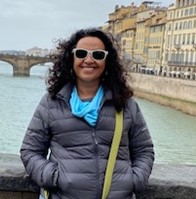
Following is an interview conducted in Hebrew by Dr. Varda Silberberg with Dr. Orit Even Shoshan–Reshef regarding the ways in which the patient and therapist create a common story based on the patient’s story—his inner world and his connection to the therapist produces the realistic world–a particularly challenging process during the era of the Corona virus. A summary of the interview is provided in English below the recorded interview.
My Time of Corona – A Bridge Between Reality and Imagination
My name is Orit Even Shoshan–Reshef, and I am a bibliotherapist and psychotherapist. I have been an emotional therapist for over 20 years. In my practice, I mainly treat adolescents.
My Therapy Philosophy
I believe that treatment is based on communication between the two objects in the treatment room. I think that in the therapeutic process, the patient and the therapist create a common story based on the patient’s story—his inner world and his connection to the therapist produces the realistic world. The shared story is in fact the bridge that connects the patient’s inner personal world to the patient’s interpersonal outer world—the reality.

Over the course of my work, I have repeatedly found the issue of the meaning of life to be a central issue in treatment. I find that the treatment space allows the patient to “make something out of nothing.” Many questions arise in relation to the meaning of life, and oftentimes, patients come with a great sense of despair and disgust in their life. I find that in the treatment room, we try to find possible meaning while giving an empathic place to the difficult feeling of emptiness and despair.
Changes During Corona
During Corona, I have had a number of individuals turn to me for help that would not be characterized as an emergency, as one might think, but rather requests for help because of a new insight. For example, parents can finally really see the adolescents who live with them due to Corona, quarantine, and unprecedented togetherness. The adolescents themselves have also seen the need for dialogue with their parents due to the circumstances. Patients will often come for emotional treatment following insights that always been there, but are blatant enough to handle them now.
In addition, during this period, I feel that there is much more room for treatment in the various art therapies and bibliotherapy.






